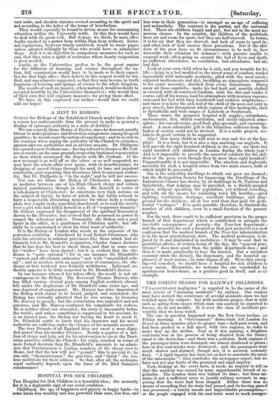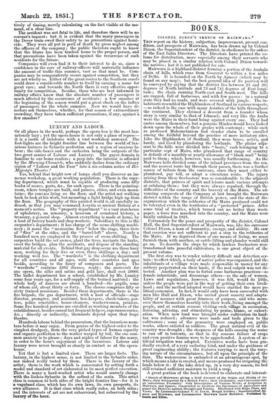THE COMING SEASON FOR RAILWAY COLLISIONS.
"lJNaccouNTABLE negligence" is reported to be the cause of the most recent of "alarming accidents by railway. Our readers may have noticed the occurrence of several aCcidents since we last touched upon the subject ; but with accidents proper, that is with such as spring from causes which man can scarcely be expected to foresee, we do not meddle. It is over the class of accidents pre- ventible that we keep watch.
The one in question happened near the New Cross incline, on Friday morning. A "Government" down-train left London for Dover at three minutes after its proper time—half-past seven, and had been pushed to a full speed' with two engines, in order to make way up the incline. Just as it was passing, a Brighton coal-train was in the process of being shunted from the Surrey canal to the down-line—and there was a collision. Both engines of the passenger-train were damaged, one almost shattered to pieces ; four or five coal-trucks were destroyed ; and the passengers were much shaken and alarmed, though not, it is averred, seriously hurt. "A rigid inquiry has been set on foot to ascertain the cause of the catastrophe": : thus concludes the newspaper report, but we have not yet any fruits of the promised and rigid inquiry.
Now, looking at the overt facts, it needs no inquiry to tell us that the accident was caused by some unpardonable breach of re- gularity. The London train was behind its time ; but three mi- nutes is not a sufficient error to justify railway servants in sup- posing that the train . had been stopped. Either there was no means of recording that the train had passed, and its having passed was presumed,—a totally unsafe and unjustifiable presumption,— or the people engaged with the coal-train went to work irrespec- tively of timing, merely calculating on the fact visible at the mo- ment, of a clear line. The accident was not fatal to life, and therefore there will be no coroner's inquest; but it is evident that the many passengers in the Dover train owed their safety to no precautions against homi- cide. They were all put in peril of death by gross neglect among the officers of the company; the public therefore ought to know that the blame has been tracked home to the proper person, and that precautions have been taken against the recurrence of such accidents for the future.
Companies will even find it to their interest to do so, since a confidence in the care of railway-officers will materially influence the amount of traffic this summer, vast as that must be. Com- panies may be comparatively secure against competition, but they are not wholly so. Either of the great routes to the Southern coasts could draw a considerable number to itself by earning a name for great care ; and towards the North there is very effective oppor- tunity for competition. Besides, those who are best informed in railway affairs know that the absolute number of passengers is much affected by the occurrence of accidents : a few smashes at the beginning of the season would put a great check on the influx of passengers for the whole summer. Now we would have di- rectors ask themselves, whether, for that season of extraordinary crowding, they have taken sufficient precautions, if any, against a few smashes ?



























 Previous page
Previous page